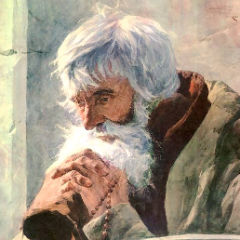
Get this scene: A monk sits on a train. A fellow passenger approaches and offers him a cigarette. Monks aren’t much known to smoke, but this monk was once a soldier and gratefully accepts the gift.
Holding the slender item, the monk suggests to his benefactor that they should make the sign of the cross before they smoke. The man is torn. Isn’t it, he asks, improper to make the sign of the cross before smoking?
The monk answers that if an activity doesn’t square with the sign of the cross, then a person shouldn’t do it at all.
The statement of the monk (who, by the way, was St. Silouan the Athonite—it’s a true story) provides a helpful guide for quickly judging our actions.
Making the sign of the cross is a physical way to express thanks to God for something, to bless something, to offer it to God. It’s a prayer, as I’ve discussed before, and St. Silouan’s point should be read to include verbal prayers as well. Put it on a 3×5 card and keep it in your wallet:
If you can’t say grace over it, then you shouldn’t do it.
This is one of the things that underlies St. Paul’s discussion about the scruples and liberties of weaker and stronger believers.
“If I partake with thankfulness,” he says, “why am I denounced because of that for which I give thanks?” The main takeaway from these passages in Romans and 1 Corinthians is that a believer with greater freedom should abstain in love if exercising his freedom causes another brother to fall. (Side note: I think it is an odd occurrence of our time that we appeal to these passages to support our freedoms—“all things are lawful”—but not our commensurate responsibility to love our neighbor, but that’s another blog post).
The thing to note is that for Paul the act of thanking God is central either way. This is particularly obvious in the Romans passage. Whether we’re the weaker or stronger brother, we should only do that for which we can offer thanks.
If you feel like you cannot thank God for an activity you’re about to undertake, if you feel like you cannot ask God to bless a particular task, then you probably shouldn’t do it at all.
Here’s a challenge: Any time you consciously do something today, try to thank God for it or ask him to bless it. If you are about to do something you know is wrong or doubt is right, does this change anything for you?











